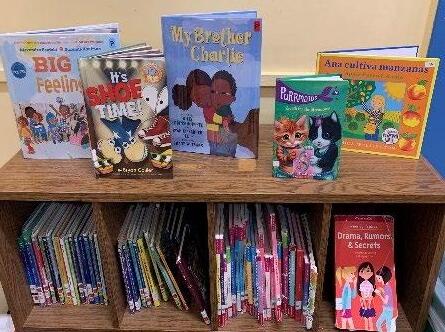
4 minute read
DEPARTMENTAL & SCHOOL REPORTS
Office Of Learning
Gabriel Hamilton, Director of Learning
Monica Desrochers, Coordinator for Equity & Inclusion
Melissa Strong, Data Manager
Points of Pride
During the 2020-21 school year, the Office of Learning continued to focus on continuing to implement the three main goals of the Addison Northwest School District’s Continuous Improvement Plan: high levels of proficiency for all students, safe and healthy school environments, and developing investment priorities. Curriculum, instruction, and assessment efforts to support our goals represent a coordinated PreK-12 approach that prioritizes equity (making sure every student has the opportunity to be successful), proficiency-based learning, and student-centered approaches. The pandemic continued to have an impact on our schools and communities. Supporting students and teachers through these trying times remained a priority. Despite the many academic and social-emotional challenges the pandemic has brought, our students, teachers, and families have been heroic in their ability to navigate these challenges.
The 2020-21 school year began with a keynote from Rebecca Haslam from Seed the Way, LLC. Her work is focused on equity pedagogies that support the social-emotional well-being of students of color. She shared expertise and resources for anti-bias curriculum and pedagogy, and equity literacy for educators. Her presentation helped to empower us to create and sustain equitable, anti-racist schools, spaces, partnerships, policies, and systems. Through professional development, we continued to explore ways in which equity translated into classroom instruction. For mathematics, the middle and high school math teams worked with Teacher Development Group, a research-based professional development organization committed to the enactment and enhancement of high-quality math instruction for all students. In literacy, ANWSD continued its partnership with Orton-Gillingham, a multi-sensory literacy-based approach to structured literacy instruction for students in grades Kindergarten through grade 6. Additionally, our middle and high schools participated in regular professional development in anti-racist practices using the Building AntiRacist White Educators framework, and having explicit instruction from Ita Meno, an activist, founding member, and anti-racist consultant for CQ Strategies.
Updates on Program
In the 2020-2021 academic year, ANWSD had 852 students enrolled in kindergarten through 12th grade, and 70 students enrolled in our Pre-K programming. 27% of ANWSD students qualify for free or reduced lunch, which is lower than the state average of roughly 40% of students. 7.3% of ANWSD identify as Black, Indigenous, Person of Color and/or Latinx.
The 2020-2021 school year necessitated flexible and supportive instruction and learning for ANWSD students. In the 2019-2020 academic year, no standardized testing was administered due to COVID-19. With that in mind, we use 2018, 2019, and 2021 to illustrate trends in math and literacy. Each spring in 2018, 2019, and 2021 students in grades 3 -11 were administered the Smarter Balanced Assessment Consortium (SBAC) and while students in grades 5, 8 and 11 were administered the Vermont Science Assessment (VTSA). These assessments offer us data of how ANWSD students perform in relation to their grade level peers locally and state-wide. The 2021 Vermont Physical Education Assessment (VTPEA) was canceled due to COVID-19.
Below are graphics that illustrate cohorts of students' performance in mathematics and literacy over time. In 2021, ANWSD 6th grade students performed, on average, above the state in both math and literacy.
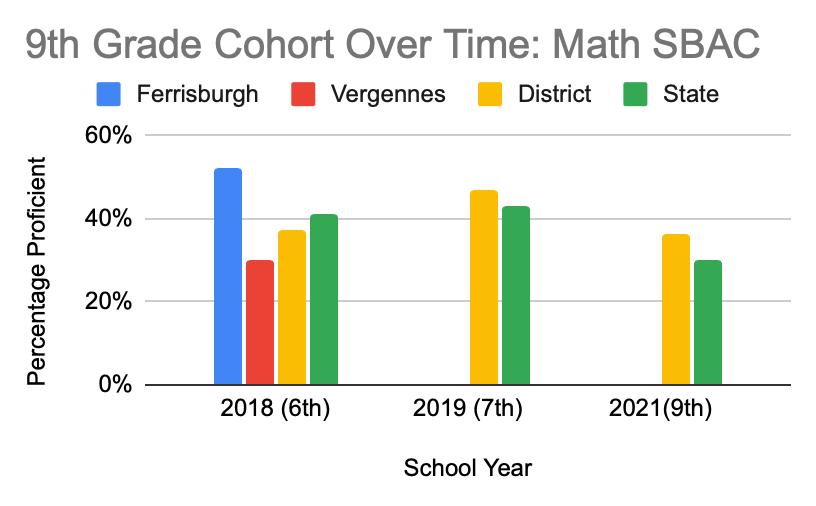
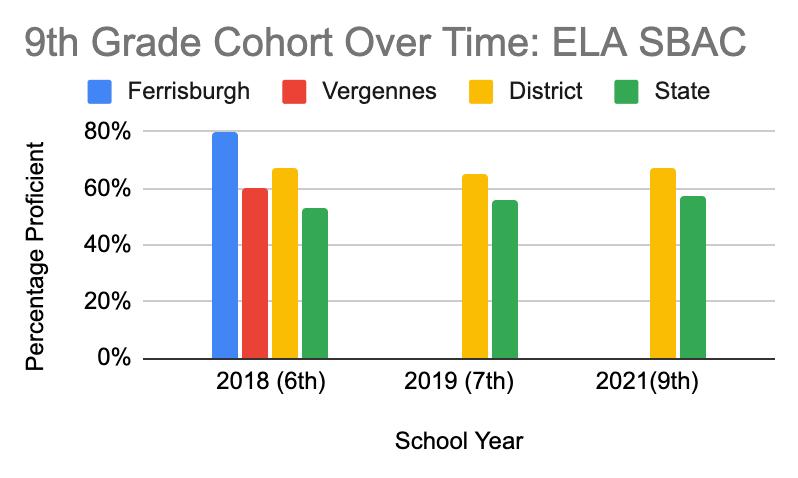
In 2021, ANWSD 9th grade students performed, on average, above the state in both math and literacy.
The following graphs display the 2021 SBAC percentages of students who scored proficient or above in mathematics and literacy for students in grades 3-9. ANWSD students in grades 3-7 and 9 performed higher than the state average, while students in grade 8 performed below the state average.
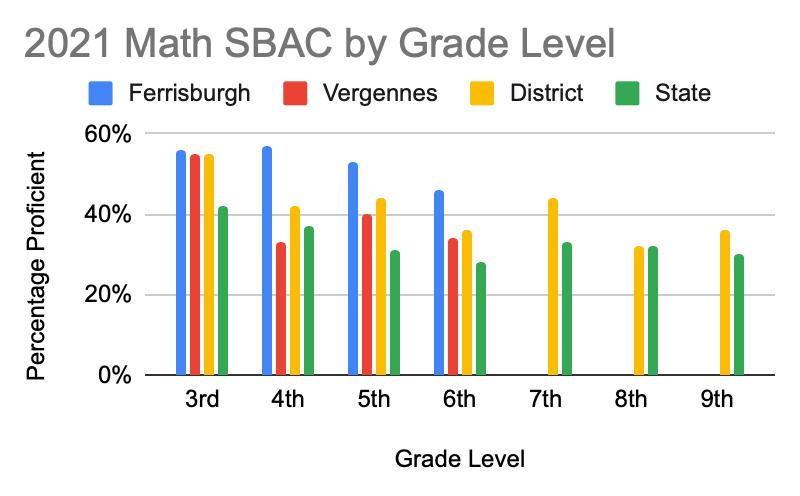
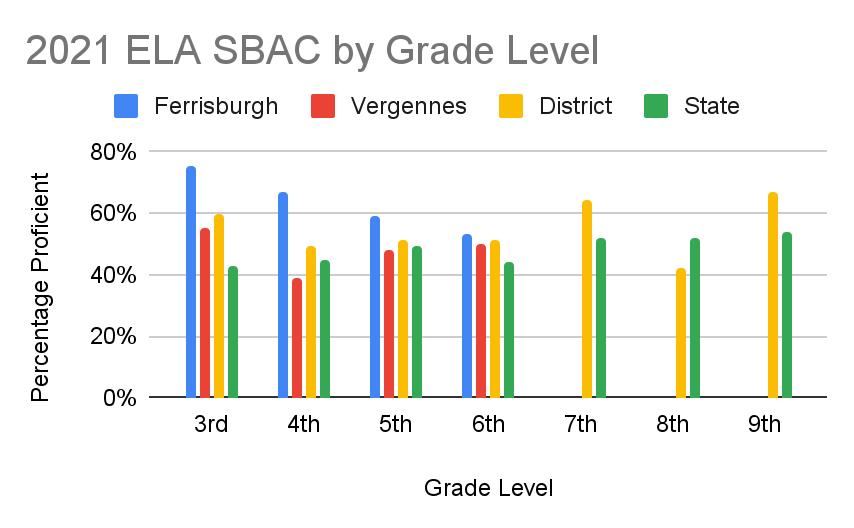
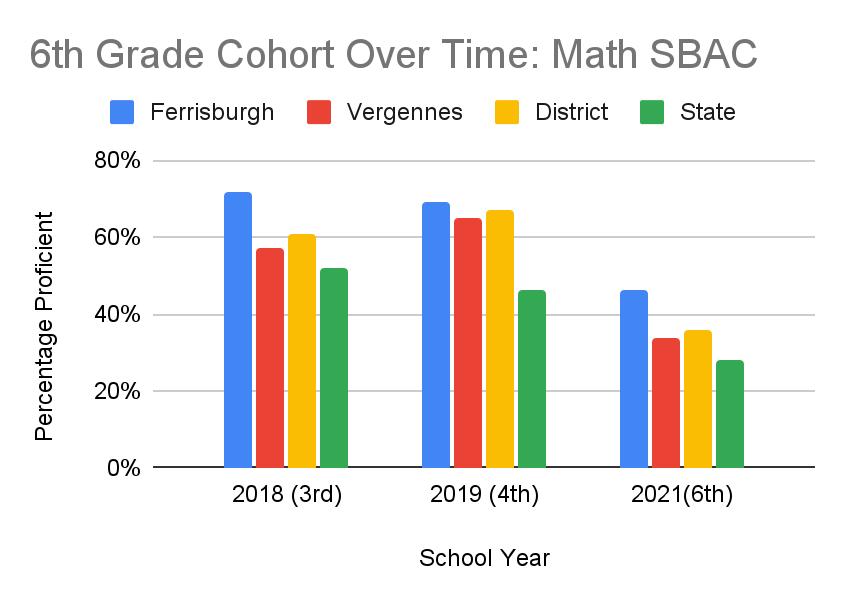
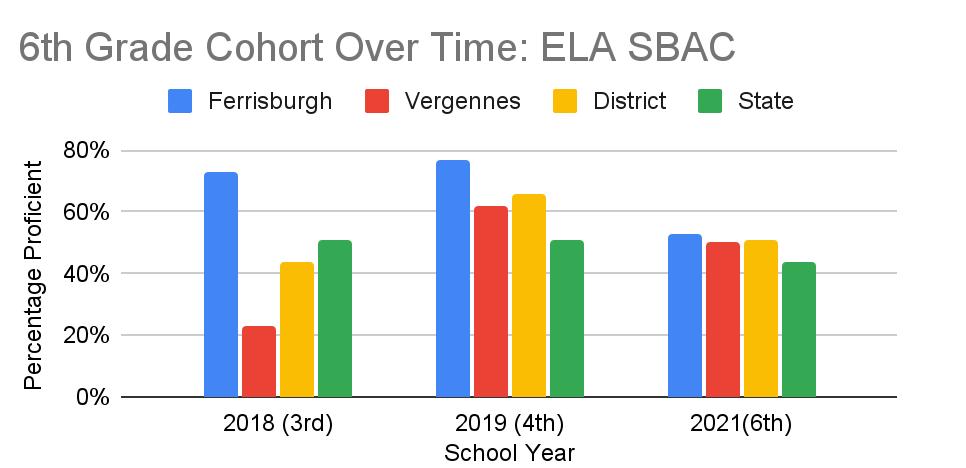
The following table and chart show the scores for the Vermont Science Assessment for 2019 and 2021. Grades 5 and 11 performed above the state average in 2021, while grade 8 performed slightly below the state average in 2021.
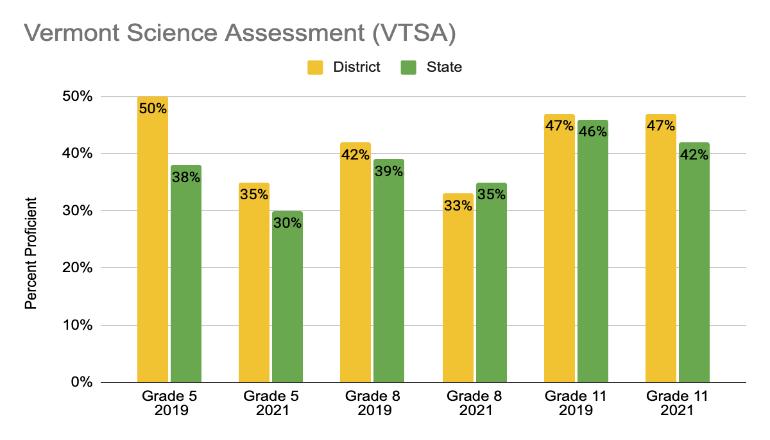
Our dual enrollment, a flexible pathway for students to earn higher education credits in conjunction with their time at ANWSD, had 34 students participating in at least one college course! Additionally, in 2020-2021, we had one student participate in our early college flexible pathway.
The ANWSD Walden Program reached its 20th year of establishment in the District! Walden has served hundreds of students from ANWSD and beyond. This outdoor program currently serves 19 students in grades 10th -12th, by working with students to create individualized educational experiences in the great outdoors. Walden provides flexible pathways for learners that are rich in 21st century and academic skills.
Future Planning
Future planning will continue to address the three goals outlined in the ANWSD Continuous Improvement Plan: high levels of proficiency for all students, safe and healthy school environments, and developing investment priorities. Consolidated Federal Grants will be written to fund professional development that supports the teaching and learning needs outlined in our improvement plans. Management of local, state, and federal grants, including Title I-A, Title II-A and Title IV-A funding, is an important, year-round process that supports Continuous Improvement Plan-identified goals.
While the SBAC and VTSA offer us one measure of achievement, ANWSD strives to refine the Local Comprehensive Assessment Plan to offer a more complete picture of our students for the 2021- 2022 school year and beyond. This refinement includes the addition of MAP (Measures of Academic Progress), a personalized mathematics and literacy tool used to measure progress by adapting to the individual student skill level, that is to be administered three times per academic year. This assessment will be paired with on-going professional development to support teachers in continuing to use data to target and tailor instruction.
Major initiatives that continue to support equitable, student-centered systems that build the capacity of our educators and improve outcomes for all students are the strengthening of our elementary instructional coaching program, the expansion of Orton-Gillingham approaches (structured literacy), modification of elementary report cards, and the refinement of systems that support students who are not achieving proficiency through Universal Design for Learning. ANWSD will expand its anti-racist trainings to include our elementary schools, with regular professional development. Furthermore, the continued revision and refinement of our Multi-tiered System of Support (MTSS) will seek to meet the needs of all students, including those below proficiency.
The pandemic has also had a significant impact on the social-emotional well-being of our students and staff. Continued planning will prioritize providing support for students and staff in these areas. Youth-adult partnerships will work to elevate student voice and agency within our systems. Each of these initiatives will involve coordination between leadership teams, administrators, educators, and students whose partnership will improve outcomes for students within ANWSD. Additionally, our Local Comprehensive Assessment Plan will include the administering of student surveys to help us understand the emotional and social needs of our students. This data collection paired with youth adult partnership professional development will work to increase positive culture and support in our schools.







